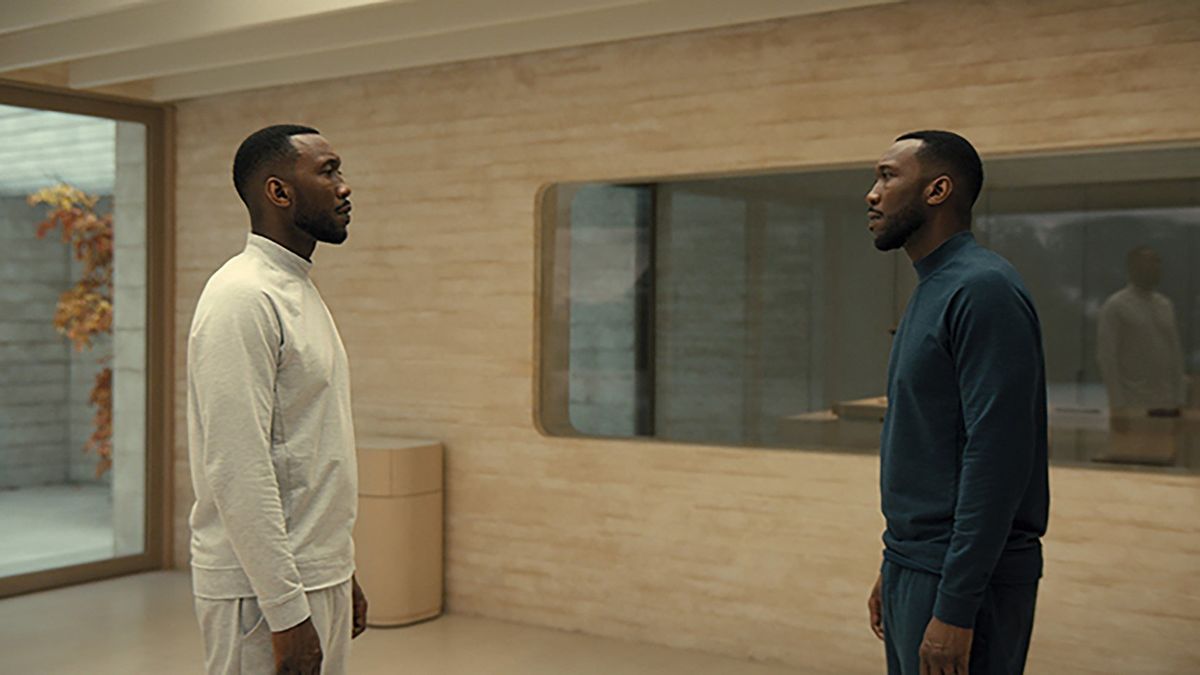Review: ‘Swan Song’ is a high-concept melodrama that’s heavy on drama, light on concept

The futuristic “Swan Song” is a maudlin tearjerker with the barest patina of a sci-fi flick that wants you to think deeply about its central, morbid question: If you could have a clone of a deceased loved one back in your life – a copy that you couldn’t tell was a knockoff – wouldn’t you? That question is articulated, early on, in a scene between Naomie Harris’s Poppy and her twin brother Andre (Nyasha Hatendi) in reference to their late mother.
The scene is a flashback because Poppy has also lost Andre, it turns out, and has only finally emerged from a year mourning her brother’s death as the main story begins. As we shortly discover, she’s also about to lose her husband, Cameron (Mahershala Ali), to terminal illness. She doesn’t know it, but he does. To spare his wife and 8-year-old son (Dax Rey) grief, Cameron has been shopping around for a high-tech solution.
He thinks he’s found one in the boutique biotech services of one Jo Scott (Glenn Close). Scott runs a mysterious – and, it is suggested, not entirely legal – clinic called Arras House, hidden in the woods, that claims to be able to clone people and download their memories. The cells of Cameron 2.0 (or Jack, as he’s called, to avoid confusion with his doppelganger) have already been cultivated in this bucolic petri dish, and Jack, a carbon copy of Cameron, is awaiting the transfer of Cameron’s memories. Ali plays both roles.
There’s only one catch: Cameron can’t, contractually, tell his family what he’s about to do, which means that, once the switcheroo is performed, Cameron will have to spend the short remainder of his days hiding out at Arras House while Jack – who will be programmed to remember nothing about his hydroponic roots – takes over for him as Cameron.
For the bulk of the film, Cameron wrestles with the decision to let go, internally and in conversation with Awkwafina’s Kate, a fellow patient at Arras House who has already undergone the duplication process. This struggle tortures Cameron, and Ali is good at conveying it, but “Swan Song” is more of a philosophical weepie than a thriller.
The feature debut of Irish writer-director Benjamin Cleary, who won the live-action short Oscar in 2016 for his affecting love story “The Stutterer,” is engineered to make you cry and think, as mentioned above. But “Swan Song” doesn’t really hold up to close or strenuous examination, except with regard to its questions about love and longing. Ruminations about the nature of human identity, on the other hand, which “Swan Song” also teases, are far more frustrating.
Aren’t we more than our molecules and memories? What about our, you know, experiences? Don’t they shape us – quite literally, in the scars and bruises we carry from our battles on this Earth – in a way that a lab-grown simulacrum cannot know? Jack may look like Cameron and have his memories, but doesn’t a life that’s truly been lived leave us with more than a shoe box full of mental snapshots, which is how Cleary conveys Cameron’s recollections? Never mind the notion of a soul.
“Swan Song” glosses over these themes while simultaneously inviting them: Jack is advertised as identical to Cameron, but, during a dry run, Cameron’s dog can somehow tell the difference. And it’s pretty obvious to us as well that these guys aren’t Tweedledum and Tweedledee. After Cameron gives Jack his memories, the two of them argue about the decision to trade places.
If they were truly indistinguishable in every way, wouldn’t they agree? In other words, wouldn’t Jack share Cameron’s doubts? As a fairly soggy, two-hankie melodrama, “Swan Song” is effective, but I wouldn’t recommend thinking about it for too long.